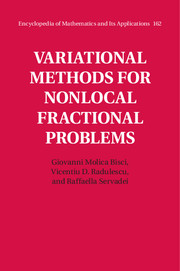Book contents
- Frontmatter
- Dedication
- Contents
- Foreword
- Preface
- Part I Fractional Sobolev spaces
- 1 Fractional framework
- 2 A density result for fractional Sobolev spaces
- 3 An eigenvalue problem
- 4 Weak and viscosity solutions
- 5 Spectral fractional Laplacian problems
- Part II Nonlocal subcritical problems
- Part III Nonlocal critical problems
- Bibliography
- Index
2 - A density result for fractional Sobolev spaces
from Part I - Fractional Sobolev spaces
Published online by Cambridge University Press: 05 March 2016
- Frontmatter
- Dedication
- Contents
- Foreword
- Preface
- Part I Fractional Sobolev spaces
- 1 Fractional framework
- 2 A density result for fractional Sobolev spaces
- 3 An eigenvalue problem
- 4 Weak and viscosity solutions
- 5 Spectral fractional Laplacian problems
- Part II Nonlocal subcritical problems
- Part III Nonlocal critical problems
- Bibliography
- Index
Summary
The aim of this chapter is to give the details of the proof of some density properties of smooth and compactly supported functions in fractional Sobolev spaces and suitable modifications thereof, which have recently found application in variational problems. The arguments are rather technical, but roughly speaking, they rely on a basic technique of convolution, joined with a cutoff, with some care needed not to exceed the original support.
As is wellknown, the natural functional space associated with the classical Laplace setting is the Sobolev space H01 (Ω). When ∂Ω is sufficiently regular, such a space may be equivalently defined as the set of functions that belongs to L2(Ω), together with their weak derivatives of order 1 and that vanish along ∂Ω in the trace sense, or as the closure of C0∞ (Ω) in the norm of H1(Ω) (see, e.g., [3]).
In this chapter, we study the density properties of the fractional space X0s,p (Ω) (see Section 2.1 for a definition) in order to establish a result similar to the one known in the classical case. Precisely, we investigate the relation between the spaces X0s,p (Ω) and C0∞ (Ω).
Sometimes density properties in the fractional framework are similar to those in the classical case, as happens for the results presented in this chapter. The reader should not infer that such fractional density properties are always well expected. For instance, it turns out that fractional harmonic functions are locally dense in the space of continuous and smooth functions (see [86]). This is in clear contrast with the classical case because harmonic functions can never approximate a function with a strict maximum (simply by the maximum principle). The results of this chapter are based on the paper [103].
The main theorems
Let K: ℝn \ ﹛0﹜→(0,+∞) satisfy assumptions (1.55) and (1.56), and let Xs,p(ℝn) be the linear space of Lebesgue measurable functions u from ℝn to ℝ such that
Then X0s,p (Ω) denotes the space of functions u ∈ Xs,p(ℝn) that vanish a.e. in. Clearly, the quantity in (2.1) defines a norm on Xs,p(ℝn) and X0s,p (Ω): such a norm will be denoted in this chapter by ‖ · ‖.
- Type
- Chapter
- Information
- Variational Methods for Nonlocal Fractional Problems , pp. 43 - 62Publisher: Cambridge University PressPrint publication year: 2016



